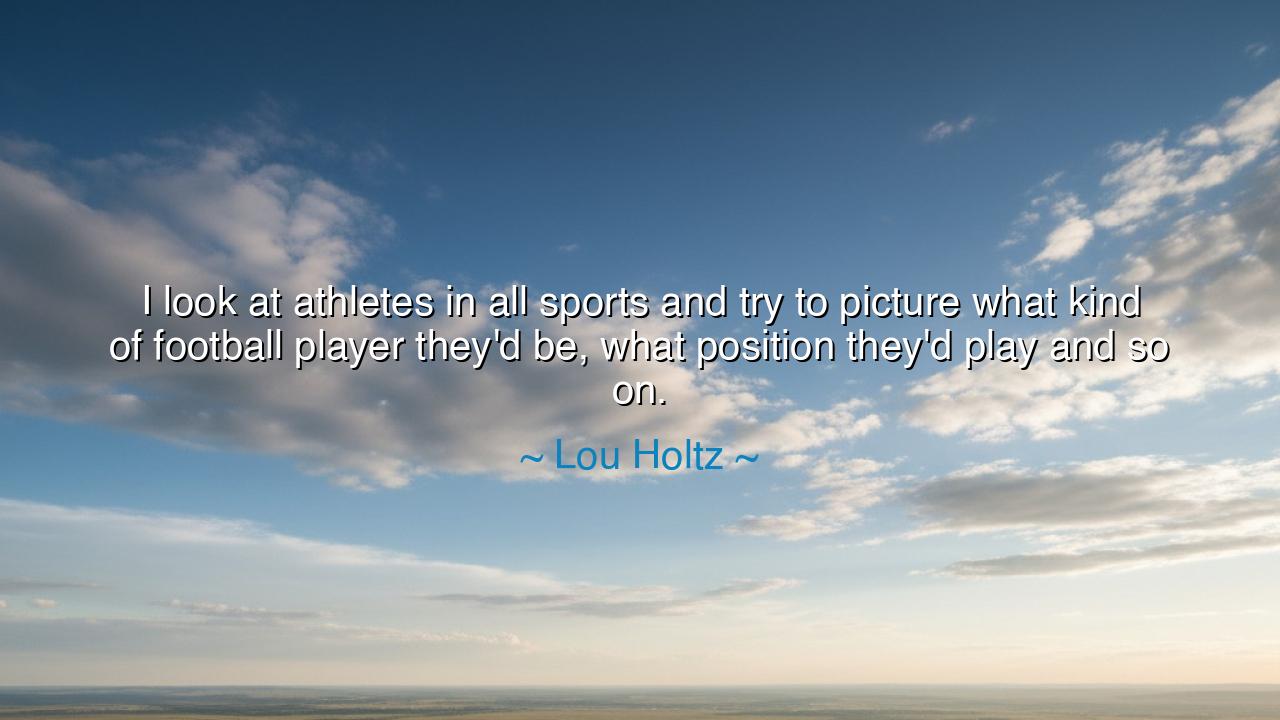
I look at athletes in all sports and try to picture what kind of
I look at athletes in all sports and try to picture what kind of football player they'd be, what position they'd play and so on.






Gather close, children, for I have a tale to tell, a tale of vision and foresight, of the way in which the mind can shape the world around us. In the words of Lou Holtz, a master of the game of football, we hear a truth that goes beyond the realm of sports. He said, "I look at athletes in all sports and try to picture what kind of football player they'd be, what position they'd play and so on." At first glance, this may seem like a mere exercise in imagination, a playful pondering of athletic potential. But look deeper, children, and you will find a profound lesson about the power of vision, the ability to see not just what is in front of us, but what could be, what might be possible.
Holtz’s words speak of the art of envisioning potential, of looking beyond the surface to understand what lies beneath. Every athlete, regardless of their sport, possesses certain attributes—strength, speed, agility, resilience—and it is through the eyes of one who understands these traits that we can begin to see how they might fit into the greater picture. Just as a sculptor sees the statue within the block of marble, a coach, like Holtz, can look at the raw material of an athlete and perceive the form that can be shaped. This is the gift of vision, the ability to take the raw elements of the world and imagine their fullest potential.
Consider the story of Leonidas, the great Spartan king, who, before battle, would assess his soldiers not just by their outward appearance, but by their inner strength and character. Leonidas did not merely look at the height or strength of his warriors; he looked deeper, seeing in them the qualities that would make them not just soldiers, but heroes. When he prepared for battle, he didn’t just see the soldiers as they were in the present, but as they could become. Holtz, in a similar way, looks at athletes and imagines how they might adapt, grow, and evolve in a new context, using their unique qualities to shine in a new role. It is this visionary thinking that makes a great coach, just as it made a great king.
This brings us to a powerful lesson, children: to understand the potential of others, you must first understand their inherent qualities. Just as Holtz imagines the football player within every athlete, so too must we look at the people around us—not just for who they are now, but for who they could become. It is too easy to judge based on appearances or immediate abilities. But true insight comes when we take the time to look deeper, to understand the core of a person, and then help them realize the fullest potential of their gifts.
Think, children, of the great mentors throughout history—Aristotle, who saw the potential in his student Alexander, not merely as a young prince, but as a future king, and a conqueror of worlds. Aristotle did not simply teach Alexander the knowledge of his day, but he cultivated in him the vision of greatness. Similarly, Holtz does not just look at athletes for their current skills; he envisions what they might become, what positions they might take, and how they might excel in ways they have yet to imagine. The great mentor is one who sees the future potential, and helps guide the student towards that vision, not merely by teaching them, but by inspiring them to believe in what they can become.
The lesson, children, is this: Do not limit others by what they are today. Instead, look at them through the lens of their potential, and help them see what they could be. Just as Holtz imagines the football player in every athlete, so too must we imagine the leader, the artist, the scholar, the warrior in those around us. The true power lies in our ability to help others see themselves as they can be, not just as they are. And in doing so, we create a world where everyone is lifted, where everyone has the chance to fulfill their fullest potential.
So, I charge you now, young ones, to look beyond the surface. Look at the people in your life—not just as they are today, but as they could become. Find the potential within them, and help them see it for themselves. Guide them not with judgment, but with the vision of what they can achieve. And in doing so, you will not only help others realize their greatness, but you will build a world where the potential of every soul is recognized, and every person has the chance to fulfill their destiny.






AAdministratorAdministrator
Welcome, honored guests. Please leave a comment, we will respond soon